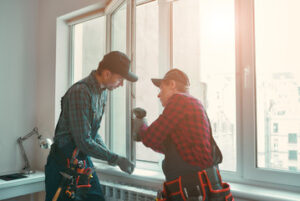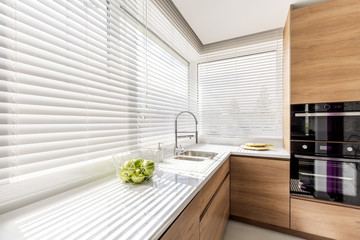Window Replacement
Windows play a critical role in the overall performance of a building, influencing energy efficiency, comfort, aesthetics, and even security. Over time, windows can deteriorate, losing their effectiveness due to wear and tear, outdated materials, or technological advancements that render older models inefficient. Replacing windows is an investment that offers substantial benefits, from improving insulation to enhancing the value of a property. Contact Window Replacement Rockville MD for professional help.
One of the most significant reasons to replace windows is to improve energy efficiency. Older windows, particularly those with single-pane glass or poorly insulated frames, allow heat to escape during colder months and permit unwanted warmth during hotter periods. This inefficiency forces heating and cooling systems to work harder, leading to higher energy consumption and increased utility costs. Modern window designs incorporate advanced glazing technologies, multiple panes, and energy-efficient coatings that minimize heat transfer, maintaining a more consistent indoor temperature and reducing the reliance on artificial climate control.
Comfort is another major factor influenced by windows. Drafts, condensation, and uneven indoor temperatures are common signs of inefficient or aging windows. Air leaks can create uncomfortable cold spots, while inadequate insulation results in excessive heat gain, making certain areas of a building less pleasant. By replacing outdated windows with well-sealed, insulated alternatives, occupants can enjoy a more stable indoor environment, free from sudden temperature fluctuations and moisture-related issues such as mold growth or excessive condensation.
Noise pollution is an often-overlooked issue that can be significantly reduced with window replacement. Older windows with thin glass and poor sealing allow external noises to penetrate indoor spaces, leading to disturbances that can affect sleep, productivity, and overall well-being. Modern window options often include laminated or double-pane glass with insulating gases that act as barriers against unwanted sound. This feature is especially valuable in busy or noisy areas, creating a quieter and more serene indoor atmosphere.
Security and safety are additional concerns addressed through window replacement. Older windows may have weakened frames, outdated locking mechanisms, or fragile glass that compromises the safety of a building. Modern windows are designed with durable materials, reinforced frames, and advanced locking systems that deter potential intruders. Impact-resistant glass options further enhance security, providing an extra layer of protection against break-ins or natural disasters. Additionally, newer window models often include features such as easy-to-operate locking systems and egress capabilities, which are particularly crucial in emergency situations.
Aesthetic appeal is another compelling reason to consider window replacement. The appearance of a building is greatly influenced by the design and condition of its windows. Faded, damaged, or outdated windows can make a property look neglected, whereas new, stylish designs can enhance curb appeal and create a more modern and attractive appearance. Window replacements provide an opportunity to refresh the overall look of a space, complementing architectural styles and improving the visual harmony of both interior and exterior spaces.
The financial benefits of replacing windows extend beyond energy savings. A well-maintained property with modern, efficient windows tends to have a higher market value. Prospective buyers are more likely to be attracted to homes or buildings with updated features that offer energy efficiency, security, and aesthetic appeal. Window replacements can serve as a valuable selling point, allowing property owners to recoup a significant portion of their investment when it comes time to sell. Additionally, reduced maintenance costs associated with modern windows, such as lower repair frequency and improved durability, contribute to long-term savings.
Advancements in window technology have introduced materials and designs that require minimal upkeep. Traditional wood frames, for example, demand regular maintenance to prevent deterioration, whereas newer alternatives, such as vinyl or fiberglass, offer superior durability with little to no maintenance. Many modern window options are resistant to warping, fading, and corrosion, ensuring long-lasting performance without the need for constant repairs or refinishing. This ease of maintenance is especially beneficial for property owners looking to reduce upkeep efforts while maintaining an aesthetically pleasing and functional space.
Environmental considerations also play a role in the decision to replace windows. Energy-efficient windows contribute to reducing carbon footprints by decreasing overall energy consumption. Buildings that require less heating and cooling place less demand on power plants, leading to lower emissions and a more sustainable lifestyle. Additionally, some modern window manufacturers prioritize eco-friendly materials and sustainable production methods, ensuring that window replacements align with broader environmental goals.
The process of replacing windows may seem daunting, but the long-term benefits far outweigh the initial investment. A professional installation ensures that windows are properly fitted and sealed, maximizing their performance and longevity. Poorly installed windows can result in air leaks, moisture infiltration, and reduced efficiency, negating the benefits of upgrading. Choosing high-quality materials and expert installation guarantees that the replacement windows will deliver optimal results for years to come.
For property owners contemplating window replacement, it is essential to assess factors such as climate, architectural style, and specific functional needs. Various window designs cater to different priorities, including maximum insulation, UV protection, noise reduction, or enhanced ventilation. Customizable options allow for tailored solutions that best suit the requirements of a given space, ensuring that the investment aligns with both practical and aesthetic goals.
While cost considerations may deter some individuals from pursuing window replacements, the long-term savings and added value make it a financially sound decision. Lower energy bills, increased property value, improved comfort, and reduced maintenance expenses all contribute to a favorable return on investment. Additionally, some regions offer incentives or rebates for energy-efficient upgrades, further offsetting initial costs and making the decision even more beneficial.
Ultimately, replacing windows is a transformative upgrade that significantly improves the overall performance of a building. Whether the goal is to enhance energy efficiency, elevate aesthetics, increase security, or reduce noise pollution, modern window solutions offer an array of advantages that enhance both comfort and value. Investing in high-quality, well-installed windows ensures long-term benefits that extend beyond immediate improvements, making it a worthwhile consideration for property owners seeking a smarter, more efficient living or working space.

